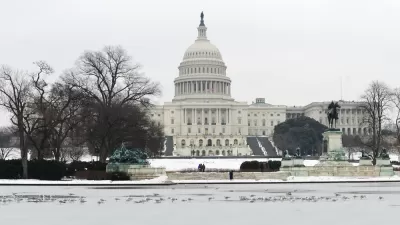An environmental economist and a law professor pronounces the increased carbon tax in British Columbia "the smartest tax in the world" and advise the U.S. to get onboard.
While U.S. politicians are debating whether the Affordable Health Care Act is a tax or penalty, Yoram Bauman from Sightline Institute and Shi-Ling Hsu from Florida State University and author of "The Case for a Carbon Tax" present their idea:
"On (July 1), the best climate policy in the world got even better: British Columbia's carbon tax - a tax on the carbon content of all fossil fuels burned in the province - increased from $25 to $30 per metric ton of carbon dioxide, making it more expensive to pollute.
This was good news not only for the environment but for nearly everyone who pays taxes in British Columbia, because the carbon tax is used to reduce taxes for individuals and businesses
Thanks to this tax swap, British Columbia has lowered its corporate income tax rate to 10 percent from 12 percent, a rate that is among the lowest in the Group of 8 wealthy nations. Personal income taxes for people earning less than $119,000 per year are now the lowest in Canada, and there are targeted rebates for low-income and rural households.
The province is waiting for the rest of North America to catch up so that its tax system will not become unbalanced or put energy-intensive industries at a competitive disadvantage.
The United States should jump at the chance to adopt a similar revenue-neutral tax swap. It's an opportunity to reduce existing taxes, clean up the environment and increase personal freedom and energy security."
Thanks to Loren Spiekerman
FULL STORY: The Most Sensible Tax of All

Planetizen Federal Action Tracker
A weekly monitor of how Trump’s orders and actions are impacting planners and planning in America.

Congressman Proposes Bill to Rename DC Metro “Trump Train”
The Make Autorail Great Again Act would withhold federal funding to the system until the Washington Metropolitan Area Transit Authority (WMATA), rebrands as the Washington Metropolitan Authority for Greater Access (WMAGA).

The Simple Legislative Tool Transforming Vacant Downtowns
In California, Michigan and Georgia, an easy win is bringing dollars — and delight — back to city centers.

The States Losing Rural Delivery Rooms at an Alarming Pace
In some states, as few as 9% of rural hospitals still deliver babies. As a result, rising pre-term births, no adequate pre-term care and harrowing close calls are a growing reality.

The Small South Asian Republic Going all in on EVs
Thanks to one simple policy change less than five years ago, 65% of new cars in this Himalayan country are now electric.

DC Backpedals on Bike Lane Protection, Swaps Barriers for Paint
Citing aesthetic concerns, the city is removing the concrete barriers and flexposts that once separated Arizona Avenue cyclists from motor vehicles.
Urban Design for Planners 1: Software Tools
This six-course series explores essential urban design concepts using open source software and equips planners with the tools they need to participate fully in the urban design process.
Planning for Universal Design
Learn the tools for implementing Universal Design in planning regulations.
Smith Gee Studio
City of Charlotte
City of Camden Redevelopment Agency
City of Astoria
Transportation Research & Education Center (TREC) at Portland State University
US High Speed Rail Association
City of Camden Redevelopment Agency
Municipality of Princeton (NJ)





























